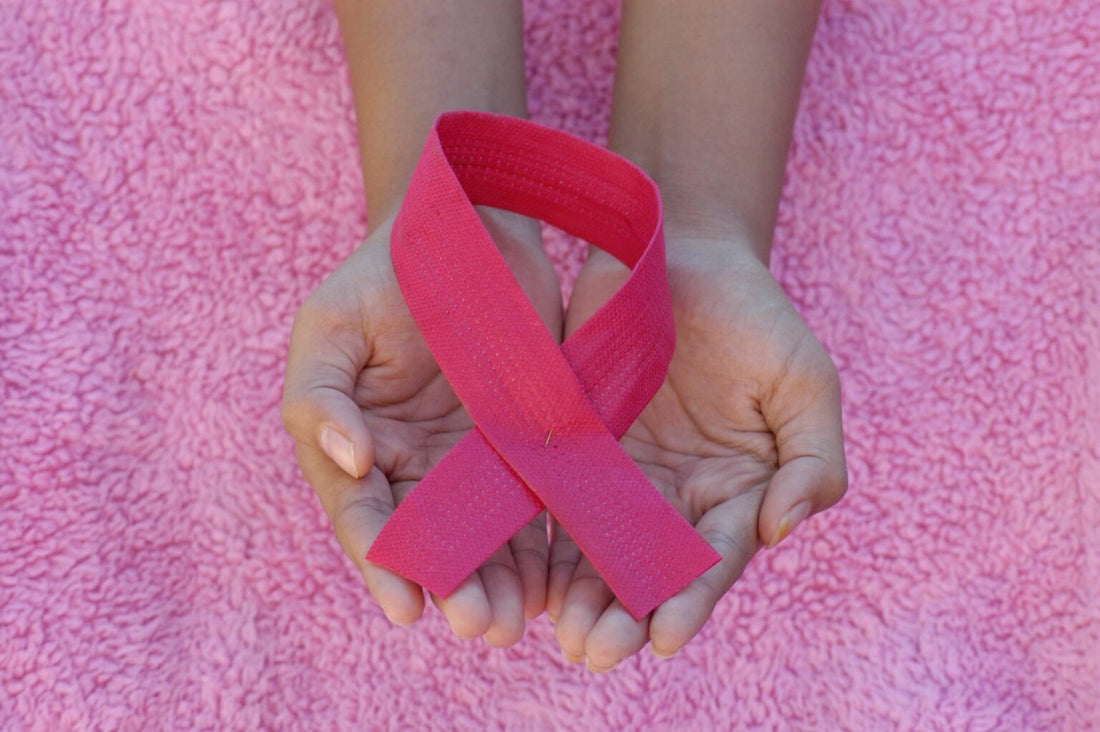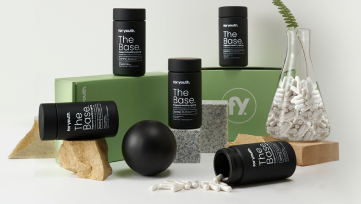Resveratrol And Cancer Prevention: What You Need To Know


 Shop our Resveratrol
Shop our Resveratrol 
→ Resveratrol has been touted as a potential cancer preventative. While many studies have explored the effects of resveratrol on cancer cells, there is still much that we don’t know.
→ In recent years, scientists have identified resveratrol as a polyphenolic compound found in red wine, grapes, and other plants that may offer anti-cancer benefits. Studies have suggested that resveratrol can inhibit the growth of some types of cancer cells in laboratory settings.
→ It’s important to note that these findings are preliminary and more research needs to be done before we can draw any definitive conclusions about its efficacy in preventing or treating cancer.
Related articles:
–Resveratrol and Weight Loss: Can This Supplement Help You Shed Pounds?
–Resveratrol David Sinclair: The Anti-Aging Supplement Backed by Science
–Trans Resveratrol vs Resveratrol: Which One is Right for You?
–NMN vs. Resveratrol – the difference explained.
–Which supplements does Longevity Expert Dr David Sinclair take?
-And more! Visit our blog now → (https://www.foryouth.co/news)

Get The Latest On Longevity Delivered To Your Inbox.
By signing up, you consent to receive For Youth emails
What Is Resveratrol?
-Resveratrol is a natural compound found in some plants, such as grapes and peanuts. It’s been studied for its potential health benefits, particularly its ability to help prevent cancer.
-Studies suggest that resveratrol could be an important part of cancer prevention because it has anti-inflammatory, antioxidant, and other properties that may reduce the risk of certain types of cancers. Resveratrol is also thought to influence how cells respond to DNA damage and modulate cell signaling pathways.
-This may help reduce the risk of abnormal cell growth that can lead to cancer development.
-In addition, resveratrol may inhibit tumor growth by inducing apoptosis (cell death) in cancer cells and suppressing their growth.
-Research also suggests that it may have anti-angiogenic properties, which means it can prevent the formation of new blood vessels needed for tumor growth and spread.
Overall, resveratrol appears to have several possible mechanisms that could help prevent cancer development.
Potential Benefits Of Taking Resveratrol

 Shop our Resveratrol
Shop our Resveratrol 
→ Resveratrol is an antioxidant found naturally in many plants, as well as foods like grapes and red wine. It has been studied for its potential benefits in preventing cancer, but more research is needed to determine if it can help reduce the risk.
One of the potential benefits of taking resveratrol is that it may have anti-inflammatory properties. This could be beneficial in reducing inflammation in the body, which can contribute to cancer development.
Additionally, resveratrol may have antioxidant effects that could help protect against damage from free radicals, which are molecules linked to increased cancer risk. Other studies suggest that resveratrol might also affect certain processes in cells that are involved in tumor formation and growth.
However, more research is needed to understand how resveratrol works and whether or not it can effectively reduce cancer risk.
Evidence Linking Resveratrol To Cancer Prevention
-It is becoming increasingly clear that resveratrol has the potential as an antioxidant-based cancer preventive agent.
-Recent studies have suggested that resveratrol may inhibit the growth of a variety of cancer cells, including colon, prostate, and breast cancers.
-Furthermore, it has been found to reduce inflammation and oxidative stress, both of which have been connected to the development and progression of cancer.
-However, further research is required to understand the exact mechanisms through which resveratrol works and how effective it can be in preventing cancer. Despite this, current evidence suggests that consuming foods that are rich in resveratrol, such as red grapes and blueberries, could be beneficial for cancer prevention. Ultimately, it appears that this naturally occurring compound holds promise as an important tool in reducing our risk of developing certain cancers in Singapore.
Potential Side Effects Of Taking Resveratrol
It’s important to be aware of the potential side effects that come with taking resveratrol for cancer prevention. Although this supplement is generally considered safe, there are still some risks you should be aware of before taking it.
In certain cases, people might experience digestive issues such as bloating or nausea, as well as allergic reactions like hives or difficulty breathing. Additionally, high doses of resveratrol may interact with certain medications, so it’s important to talk to your doctor before using it.
Furthermore, if you have any underlying medical conditions, such as diabetes or kidney disease, then it’s best to avoid resveratrol altogether. Ultimately, while the potential benefits of taking resveratrol may outweigh the risks for many people, it’s still important to weigh the pros and cons before adding this supplement to your routine.
Making An Informed Decision On Resveratrol
Despite the potential side effects of taking resveratrol, it is important to consider the research that has been conducted on its potential benefits in cancer prevention.
Studies have found that resveratrol can prevent cancer cells from multiplying and spreading, as well as reduce inflammation in the body and protect against oxidative stress.
Ultimately, it is up to an individual to make an informed decision on whether or not they want to take resveratrol.
It’s important to weigh out the pros and cons of any supplement before taking it, as well as talk to a doctor or nutrition specialist about any possible risks.
Additionally, be sure to look into the quality and purity of the supplement for maximum safety and effectiveness.
Do You Know The Grape – Resveratrol by ForYouth ?

⇒ Description → The Grape – Resveratrol by For Youth!
-Resveratrol, a natural compound found in grape skin, is a scientifically-supported anti-aging supplement that activates longevity genes to protect your cells, promoting a longer and healthier life.
Our resveratrol supplement is of the highest quality, with 99% purity, and provides a range of benefits including increased energy levels, antioxidant support, and support for cardiovascular health and other aging-related issues.
-We offer two bottle sizes: 30 caps and 90 caps, which can be purchased individually or through a subscription. A single bottle contains 30 caps of 300 mg 3rd-party lab-tested, 99% pure, synthesized, high-quality white trans-resveratrol, with a recommended dosage of one cap per day.
→ In Singapore, we also offer discounts for monthly subscriptions and bulk purchases, with up to 15% off for a 3-month supply.
→ Check out our bundles for even more savings. To learn more about resveratrol and its benefits, please visit our website → https://www.foryouth.co/
Conclusion
→ Resveratrol, a natural compound found in grapes and other plants, has been studied extensively for its potential role in cancer prevention. While studies have suggested that it may have anti-cancer benefits, more research is needed to understand its effectiveness and potential side effects.
→ Resveratrol appears to have several mechanisms that could help prevent cancer development, such as its anti-inflammatory and antioxidant properties, as well as its ability to induce cell death in cancer cells and inhibit the formation of new blood vessels. Ultimately, individuals should make an informed decision about whether or not to take resveratrol after weighing its potential benefits and risks and consulting with a healthcare professional.
→ ForYouth offers a resveratrol supplement derived from grapes that may be of interest to those seeking potential health benefits.
FAQ:
1. What is resveratrol?
Resveratrol is a naturally occurring polyphenol compound found in certain plants, including the skins of red grapes, blueberries, raspberries, mulberries, and peanuts. It’s often credited with various health benefits, including anti-inflammatory, antioxidant, and potentially anti-cancer properties.
2. How does resveratrol potentially prevent cancer?
Resveratrol is believed to prevent cancer through several mechanisms. It can act as an antioxidant, protecting cells from DNA damage that might lead to cancer. It also influences inflammation, which is related to cancer development, and affects the process of cell division, potentially preventing cancer cells from spreading.
3. Are there scientific studies supporting resveratrol’s effectiveness in cancer prevention?
Yes, various in vitro (test tube) and in vivo (animal) studies have suggested that resveratrol can inhibit the growth of a variety of cancer cells, including those from breast, prostate, stomach, colon, pancreatic, and thyroid cancers. However, human studies are limited, and more research is needed to confirm its efficacy in humans.
4. Can resveratrol cure cancer?
There is no scientific evidence to suggest that resveratrol can cure cancer. While it may have potential as a preventive measure or as an adjunct therapy, it should not be considered a substitute for conventional cancer treatments.
5. What is the recommended dosage of resveratrol for cancer prevention?
Currently, there is no established dosage of resveratrol for cancer prevention due to the lack of sufficient human studies. Dosages in studies have ranged widely, and what may be effective in animals or cell cultures may not be safe or effective in humans.
6. Are there any side effects of taking resveratrol supplements?
Resveratrol is generally considered safe when consumed in amounts found in food. However, supplements may cause side effects, especially at high doses. These can include digestive issues, headaches, and dizziness. It’s important to consult with a healthcare provider before starting any new supplement regimen.
7. Can resveratrol be obtained from food?
Yes, resveratrol can be obtained from food, particularly red wine, grapes, some berries, and peanuts. However, the amount of resveratrol in food sources is relatively small compared to the doses used in most animal and cell studies.
8. How can I include resveratrol in my diet for potential cancer-preventive benefits?
Including a moderate amount of resveratrol-rich foods, such as red grapes, berries, and peanuts, in your diet can be beneficial. Moderate consumption of red wine may also contribute to dietary resveratrol intake. However, focusing on a balanced diet rich in a variety of fruits, vegetables, and whole grains is the best approach for cancer prevention.
9. Should I take resveratrol supplements?
Given the limited evidence in humans, it’s recommended to seek advice from a healthcare professional before starting resveratrol supplements, especially for cancer prevention purposes. They can provide guidance based on your specific health needs and conditions.
10. Are there other natural compounds similar to resveratrol with potential cancer-preventive properties?
Yes, there are other natural compounds with potential anti-cancer properties, including curcumin (found in turmeric), quercetin (found in onions and apples), and sulforaphane (found in broccoli and other cruciferous vegetables). As with resveratrol, more research is needed to fully understand its effects on human health and cancer prevention.








